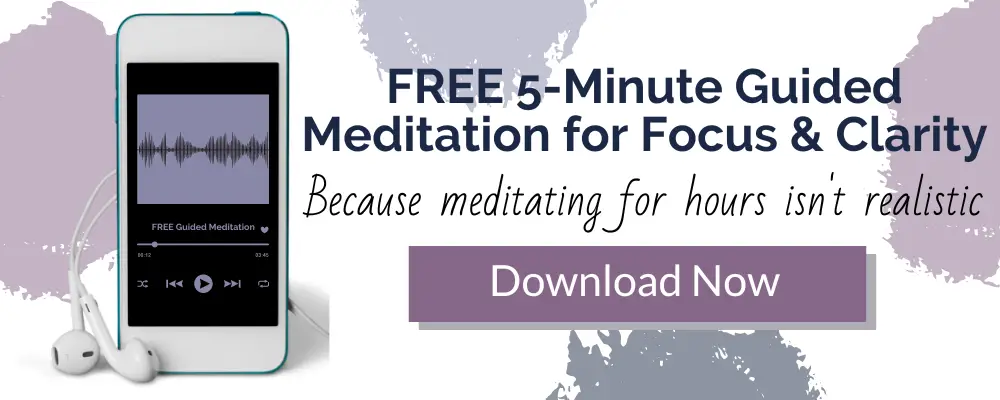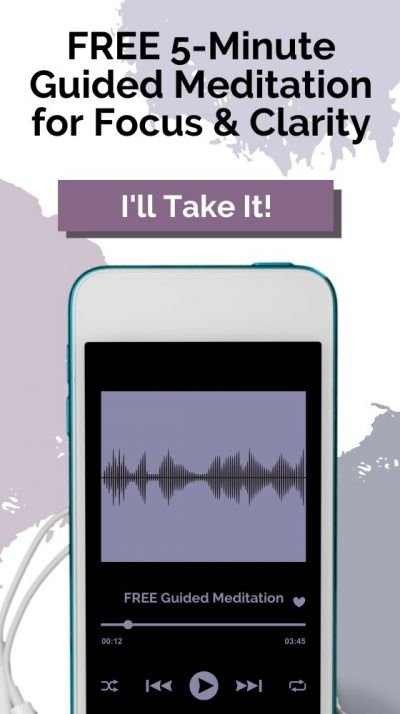Does Meditation Count as Sleep? Meditation vs Sleep

Ever feel like there’s no way on earth you’ll be able to find a few spare minutes to meditate? You’re running on empty with an endless list of tasks, responsibilities, and commitments. What if you could wake up a bit earlier, or go to bed a little later without worrying about getting enough sleep?
What if I told you that you could swap out some of your time spent slumbering for meditation instead? I know that might sound crazy, and you’re probably wondering: Does meditation count as sleep? Short answer, yes. Studies show that you can safely replace a portion of your sleep with meditation and still feel rested and alert.
Let’s put it this way: if they were food, snoozing would be your hearty main course and meditation your refreshing appetizer. The appetizer definitely gets your taste buds going, and can stave off the worst hunger pangs, Meditation, our appetizer, relaxes and refreshes you, providing a much-needed pause button in our fast-paced lives. But like an appetizer, it isn’t the whole meal.
Sleep, on the other hand, is the main course of our rest menu. It’s when you physically and mentally get the chance to fully repair, rejuvenate, and get ready for the next level of the game of life.
Understanding Sleep
Ever wonder what’s happening while you’re lost in dreamland each night? Going to bed at night isn’t just about getting some shut-eye.
What is Sleep
Sleep is an complicated process where your body and mind get together for some major maintenance work. You’re able to shut out everything going on in your surroundings, pause all of your movement, and let yourself rest.
From a scientific standpoint, it’s all about restoration and recovery. It’s your physiology’s built in scheduled maintenance, working overnight to make sure you’re ready to rock the next day.
Its important to note that there’s a big difference between getting a full night of revitalization versus just taking a nap. Deep rest is regenerative, while a nap may leave you feeling groggy and sluggish.
Benefits of Sleep
The benefits are impressive. Research shows a good night’s sleep works wonders for your memory, mood, and even your waistline. Here’s just a short list of the many benefits of a restful night:
-
- Strengthens the immune system: It supports your natural defenses against infections and diseases.
- Enhances memory and learning: During suspended consciousness, your brain processes and consolidates new information and memories and assists with problem solving.
- Regulates hunger hormones: Adequate rest helps maintain a healthy balance of the hormones that make you feel hungry or full.
- Tissue Repair: Your brain releases growth hormone which helps to build and repair tissue, bones and muscles.
- Supports heart health: Contributes to a healthier heart by regulating blood pressure and reducing the risk of cardiovascular disease.
- Boosts mood and mental well-being: Lack of rest can make you more prone to mood swings and emotional disorders. A restful slumber fosters emotional stability and positivity.
- Improves productivity and concentration: A full night’s slumber sharpens your attention, decision-making skills, and creativity.
- Assists in maintaining a healthy weight: Proper rest patterns can help regulate metabolism and, in turn, maintain a healthy weight.
In the grand scheme of things, getting enough rest plays a huge role in overall health. It’s like the silent partner in your life, always working behind the scenes to keep you in tip-top shape.
Types of Sleep
It isn’t just “switching off” for the night. It’s more like your bod and mind throwing a secret, restorative party while you’re blissfully unaware. The party has two main events: Non-Rapid Eye Movement (NREM) and Rapid Eye Movement (REM).
NREM starts the party and has three stages. Stage N1 is like the warm-up act, the light sleep when you’re just starting to drift off, in the beginning stages of falling asleep. Stage N2 is a bit stronger; your heart rate slows and you get a tad cooler. It’s the chill phase of the party.
Your brain waves during non-REM sleep are the most similar to the brain waves produced during meditation. This is where we fall asleep.
Stage N3 is where the main event kicks off. This is the “slow-wave sleep stage”, the part of the night where you get busy with repair and rebuild tasks. It’s like your anatomy’s personal team of handy-people getting to work.
Then, REM steps in, making up about a quarter of the sleep cycle. This is the after-party, where most of the dreaming happens. Your brain gets active, almost as if you’re awake, sorting and storing all the day’s information.
Understanding Meditation
Meditation isn’t just about sitting still; it’s a powerful tool that can enhance our overall quality of life, fostering a healthier, happier mindset.
What is Meditation

In its simplest form, meditation is a practice where an individual uses practices like deliberately focusing their mind on a particular thought, object, or activity to train attention and awareness. It’s like a workout for your mind that helps bring calmness and mental clarity.
Benefits of Meditation
Meditation is a life-enhancing practice with a wide range of benefits that span both the mind and the physical being. Here are some of the key benefits this practice provides:
-
- Lowered Blood Pressure: Regular practice has been associated with decreased blood pressure, reducing the risk of hypertension and cardiovascular diseases.
- Boosted Immune System: It can enhance immune function, promoting a stronger defense against infections and diseases.
- Improved Sleep Quality: By reducing stress and promoting relaxation, meditation can help improve the quality of sleep, leading to better overall physical and mental health.
- Pain Management: Mindfulness meditation
- has shown promise in reducing chronic pain and increasing pain tolerance, providing a natural approach to pain management.
- Enhanced Respiratory Function: Box breathing, or breath control known as Pranayama is often incorporated and can improve lung capacity, respiratory function, improving sleep apnea and overall respiratory health.
- Reduced Muscle Tension: Contemplation triggers the relaxation response, resulting in subdued muscle tension, lower heart rate, and overall relaxation, promoting physical well-being and combating the effects of chronic stress.
Meditation and Mental Health
Just like physical exercise keeps our bodies fit, regular meditation is a way to ensure our mental fitness.
-
- Stress Reduction: Meditation is a powerful tool for reducing stress levels by activating your relaxation response and calming the mind.
- Improved Emotional Well-being: Regular practice has been linked to increased emotional resilience, helping individuals navigate challenging emotions and cultivate a more positive outlook.
- Enhanced Self-Awareness: You can develop a clear understanding of your thinking, emotions, and patterns of behavior, leading to improved self-awareness and self-reflection.
- Reduce Anxiety and Depression Symptoms: Numerous studies have shown a significant reduction in symptoms of anxiety and depression, slowing racing thoughts, providing relief and promoting mental well-being.
- Improved Focus and Concentration: By training the mind to focus and be present, you can enhance cognitive abilities, including attention span, concentration, and mental clarity.
- Promotion of Mindfulness: This is a central component of most practices and involves non-judgmental awareness of the present moment. This practice fosters a sense of grounding, reducing rumination and increasing overall ability to be centered in daily life.
Does Meditation Count as Sleep?
Now, let’s tackle the big question: Does meditation count as sleep? To understand this, it’s helpful to identify the common ground between these two states.
How Are Meditation and Sleep Similar?
Both are essential for our well-being and have a lot more in common than you might think.
While meditation and sleep share some similarities, they are not identical states. Each plays its unique role in maintaining our physical and mental health. However, integrating both into your routine can have a complementary effect, contributing to your overall wellness and life quality.
Rest and Recovery
One of the key similarities lies in rest and recovery. Both meditation and sleep allow us to rest, recover, and heal. Sleep, as we know, is a natural state that we need for survival. It’s when our physical form does all the heavy lifting of repairing cells, strengthening the immune system, and more.
On the other hand, while not replacing the physical restoration that occurs during sleep, relaxation does give our minds a necessary break from the constant input of information we encounter daily. It’s like hitting a pause button, providing a period of decreased mental activity that can leave us feeling refreshed and revitalized.
Shared Mental Health Benefits
Sleep and meditation also share similarities when it comes to mental health benefits. High quality, comfortable rest is essential for maintaining our mental health, from improving memory and concentration to reducing anxiety and depression.
This type of focused relaxation also offers mental health benefits by reducing stress, improving concentration, promoting positivity, and supporting overall mental health. In fact, awareness-based meditation can help regulate emotions, improve mood, and even alleviate symptoms of mental health disorders, similar to a restful night’s sleep.
While they share some similarities, they are not identical states. Each plays its unique role in maintaining our physical and mental health. However, integrating both into your routine can have a complementary effect, contributing to your overall wellness and life quality.
What’s the Difference Between Meditation & Sleep?
While meditation and sleep share some similarities, they are distinct in several ways that affect our physical and mental states. Let’s peel back the layers and understand these differences.
Physical and Mental
Firstly, in terms of physical states, sleep and meditation are different. Sleep requires a horizontal position, closed eyes, and a lack of conscious awareness. On the other hand, meditation, depending on the technique, generally involves a sitting or lying position with a focus on maintaining a conscious awareness of the present moment, your breath, or a specific object or mantra.
Now, let’s discuss the mental states. Especially during the REM stage, our brains are highly active, consolidating memories and processing emotions. However, we are not consciously aware of this activity. In contrast, while in relaxation, we aim to remain in a state of conscious awareness while reducing mental chatter.
The Science Behind Sleep and Meditation
Scientifically, the brain functions differently in sleep and meditation. Sleep involves cycling through different stages, including REM and non-REM stages, each associated with specific brainwave activities and bodily functions. For example, REM, the fourth stage, the slow brain wave stage, involves delta waves, which are associated with bodily recovery and growth.
On the other hand, meditation involves a conscious shift in brainwave activity. Depending on the type of practice you choose, brainwaves can shift from the normal waking state of beta waves to more relaxed alpha waves and even to theta waves typically associated with tranquility and creativity.
In a nutshell, while meditation and sleep both contribute to rest and recovery, they involve different physical postures, levels of consciousness, and brain activities. Each plays a distinct role in maintaining our overall well-being and cannot substitute the other. However, combining both can provide a synergistic effect, promoting enhanced physical and mental health.
Try to meditate at the same part of the day. Make it a part of your regular routine. With regular practice, you can improve your circadian rhythm, your 24 hour sleep-wake cycle, and you’ll get a better night’s rest.
Can Meditation Replace Sleep?
Can you meditate instead of sleep? Meditation can be a valuable tool to complement and enhance your rest and restoration, but it cannot take the place of need for sleep.
It can help lessen your sleep requirements and improve the quality of rest you receive, leading to a more refreshed and energized. So, while meditation offers its own unique benefits, a restful night’s sleep remains essential for optimal physical and mental wellbeing.
Can Meditation Help You Reduce Your Need for Sleep
These practices, especially “effortless relaxation” methods like yogic sleep or progressive muscle relaxation, can induce a state of profound relaxation similar to REM. These practices activate the natural relaxation response, leading to increased calmness and a sense of rejuvenation.
A review published in the Annals of the New York Academy of Sciences found that advanced meditators were able to trim their need for sleep by between 1 and 4 hours.
By entering an intense meditative state, you can experience a degree of restfulness that can help alleviate fatigue and energize your mind and physique. It’s like giving yourself a mini-vacation, allowing you to recharge and face the day with renewed vigor.
How Much Sleep Can Meditation Replace?
The amount of sleep that meditation can substitute varies from person to person. Typically, adults need between 7 to 9 hours of sleep per night for optimal health and well-being.
How much can meditation reduce the number of hours of sleep needed?
A study done by Oregon State University found that meditation replaces sleep with as little as 10 minutes of meditation per day compensating for about 44 minutes of sleep. While regular practice can help lower the need for excessive sleep in some individuals, it’s essential to listen to your physical signals and ensure you’re still getting an adequate amount to support your overall health.
Can Meditation Help Me Sleep Better?
Absolutely! Meditation can be a fantastic ally in your quest for a better night’s rest. By incorporating specific meditation practices into your evening routine, you can create a peaceful transition into slumber.
Types Of Deep Sleep Meditation For A Good Night’s Rest
When it comes to sleep meditation, there are a few popular methods worth exploring:
- Yoga Nidra: This practice, also known as “yogic sleep,” involves guided relaxation and visualization to induce a focused state of relaxation and promotes a restful and relaxed evening experience.
- Progressive Muscle Relaxation: By progressively tensing and releasing different muscle groups, you can release bodily tension and promote physical relaxation, facilitating a more peaceful experience. You can try a guided meditation that leads you through each major muscle group.
- Breathing Exercises: Breathwork techniques, such as diaphragmatic breathing, 4-7-8 breathing, or alternate nostrils, can activate the natural relaxation response, helping you wind down and relax.
- Body Scan: This meditation is a type of focused meditation that involves mentally examining yourself from head to toe, releasing any tension and promoting physical relaxation.
Remember, finding meditation techniques that resonate with you may require some experimentation. Everyone’s renewal journey is unique, so explore different approaches until you find what works best for you.
Ideal Balance Between Sleep and Meditation
The ideal balance between slumber and meditation lies in integrating both practices into your routine to harness all the benefits they share. Sleep provides crucial physical and mental restoration, while meditation enhances presence, lowers stress, and promotes overall well-being.
Strive for a balanced approach that prioritizes sufficient sleep while incorporating regular meditation sessions to enhance relaxation and mental clarity. Avoiding stimulants, such as caffeine or screen time before meditation or sleep is one way to enhance both.
Try It For Yourself
In the realm of restoration and meditation, each holds its own valuable role in promoting our well-being. Sleep offers essential physical maintenance, while meditation cultivates awareness and lessens stress. While meditation cannot fully take the place of sleep, it can help improve its quality and minimize the need for excessive sleep.
By finding the right combination of both practices, you can unlock a harmonious balance that supports your overall health and facilitates a peaceful, rejuvenating slumber. So, embrace the power of sleep and meditation as vital companions on your journey to optimal well-being, but you’d still need your main course to feel truly satisfied.













